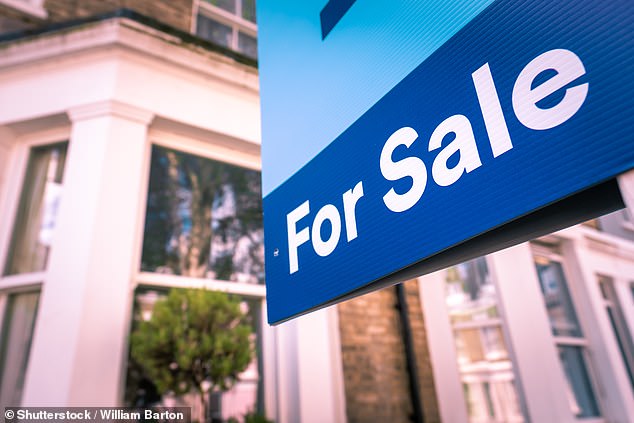Sellers are being urged to price their homes competitively after an influx of properties went up for sale at the end of last month.
Rightmove said a “huge number” of new sellers were coming onto the market just before the Easter holidays.
It said the Thursday before Easter, March 28, was the biggest day for the number of new sellers entering the market so far this year.

Rightmove said the Thursday before Easter, March 28, was the biggest day for the number of new sellers entering the market so far this year
It was also the third biggest day for new listings since August 2020. Only Boxing Day in 2022 and Boxing Day in 2023 saw more properties come onto the market in a single day.
And 45 percent more homes were added to Rightmove on that Easter Thursday compared to the same day the week before.
Rightmove attributed the surge in supply to people putting their homes on the market in a bid to attract buyers’ attention over the Easter weekend.
Tim Bannister, property expert from Rightmove, said: ‘A large number of new sellers came onto the market as we all got ready for the Easter holidays, all in the hope of catching the attention of the buyers who used the long weekend to Easter egg hunt you can also go house hunting. .
‘It is still a price-sensitive market, so while the upturn in activity we have seen in recent months is a positive sign, sellers should still heed their agent’s advice on competitive pricing to secure a successful sale to state.’


Sellers are being urged to price their homes competitively, amid an influx of properties for sale late last month
It follows an 18 percent increase in asking prices over the past four years, amid a lack of supply and high demand for homes for sale.
The average asking price of a house in Britain was £312,625 at the start of the pandemic in March 2020.
According to Rightmove, this compares to an average asking price of £368,118 in March this year.
| Region | Average asking price March 2024 | Average asking price March 2020 | % change |
|---|---|---|---|
| Wales | £256,499 | £199,249 | 29% |
| North West | £257,185 | £201,199 | 28% |
| Yorkshire and The Humber | £247,054 | £196,002 | 26% |
| East Midlands | £287,145 | £230,783 | 24% |
| West Midlands | £288,945 | £233,224 | 24% |
| South West | £383,889 | £313,127 | 23% |
| North-East | £187,592 | £153,694 | 22% |
| Scotland | £190,067 | £159,149 | 19% |
| Southeast | £478,936 | £408,796 | 17% |
| East of England | £415,199 | £356,709 | 16% |
| London | £686,844 | £638,826 | 8% |
| Great Britain | £368,118 | £312,625 | 18% |
| Source: RightMove |
North London estate agent Jeremy Leaf said: ‘Supply has increased quite significantly this year compared to last year and demand has also improved, especially after a largely subdued 2023.
‘However, the extra choice has caused buyers to negotiate harder and delay before taking the plunge.
“As a result, some prices are softening slightly or not rising as much as we expected, while affordability concerns remain.
‘While it is clear that interest rates are heading south, it will take some time for these cuts to take effect in terms of repayments and confidence.’
Are buyers delaying elections ahead of the general election?
There is also the matter of the upcoming general election and how it will impact the property market, especially if buyers delay their purchase.
Estate agent Savills has claimed that the majority of buyers and sellers at the top end of the housing market will not be deterred by the election.
The survey among 1,200 movers on the primary market showed that for 79 percent the elections do not change their moving plans.
Despite a general election looming, the low likelihood of a change of government means that political changes are already largely priced into the market, and buyers will not be deterred from switching.
At the same time, 13 percent said they want to do this more in the next 12 months, while only 8 percent say they are less willing to move.
Lucian Cook of Savills said: ‘With mortgage markets steadily improving, the outlook for the housing market has certainly improved and has entered the first phase of recovery.
‘For the first time since the mini-Budget, the survey indicated stronger confidence among typically more indebted buyers, pointing to a market that will be less heavily dominated by cash- and equity-rich buyers.
‘Despite the looming general election, the slim chances of a change of government mean that political changes are already largely priced into the market, and buyers will for the most part not be deterred from going ahead with major decisions.
‘However, there will be more caution at the top end of the market, which tends to be much more discretionary. Buyers here are more likely to take a wait-and-see approach and price sensitivity may persist in the run-up to the elections.’

